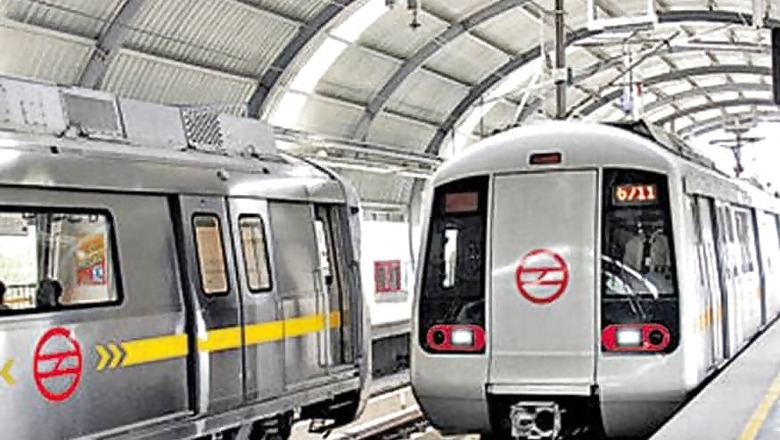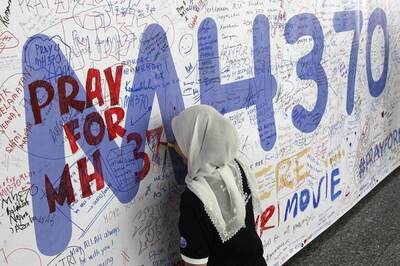
views
New Delhi: A Parliamentary committee on the Welfare of SC/STs accused the Delhi Metro Rail Corporation for giving “excuses” and “avoiding its social responsibilities” citing absolute lack of representation of the backward communities in the DMRC board.
The Lok Sabha Committee on the Welfare of Scheduled Caste and Scheduled Tribes presented its report on the “Reservation for and employment of Scheduled Castes and Schedules Tribes in Delhi Metro Rail Corporation” and found glaring issues such as, “no specific measure for upliftment of SC/ST people…since inception”, not a single member of the community in its board and just one sent abroad for training in three years.
Registered in 1995, the DMRC has equal equity participation from the Union Urban Development Ministry and the Delhi government. But AAP has been at loggerheads with the Hardeep Singh Puri ministry over the past years, accusing the BJP government of mismanagement and recently it sought an explanation from the ministry after a report cited fall in ridership after fare hikes. AAP claimed that the move had led to increase in pollution and impacted economically weaker sections of the societyD=
Of 17 directors on board, not one SC/ST
The panel noted that of the 17 members on the DMRC board, not a single member from SC/ST communities was present. “The Committee strongly feels that no sincere efforts have been made by the Government either to appoint functional Director or nominee Director from SC/ST community,” it said, recommending a clear policy to appoint at least a single director from the SC/ST community.
In view of the constitutional mandate of socio-economic justice, the panel also recommended that the DMRC must provide representation to the SC and the ST through reservation in Board of Director, or “at least by appointing a director in the board through nomination” by either the Centre or the state.
The DMRC told the committee that there was no bar in appointment of members from the SC/ST community, and they were “as much eligible to be considered”, but argued that “all the seven posts of the functional Directors are single post cadre, for which no reservation is applicable”. The DMRC added that there were no guidelines prescribing reservation for the post and that their absence “is only incidental”.
Criticising the DMRC, the committee said that the DMRC was “not serious to the observation and recommendation made by the Committee from time to time in regard to reviewing of policy on appointments to the Board/Management level posts in all the PSUs including Delhi Metro Rail Corporation (DMRC).”
“In place of giving excuses for the appointment of SC/ST candidates to the Board level position,” the committee recommended that DMRC take up the matter with the DoPT and “make genuine efforts to ensure their representation.”
Why aren’t SC/ST candidates getting hired?
The committee said it was “not satisfied with the stereotype reply” provided by the DMRC that SC/ST candidates weren’t “available at entry level and in promotion even after meeting relaxed standard.”
It argued that there must be a “lacuna in advertisement of vacancies or grading of SC/ST…otherwise there is dearth of talent in SC/ST candidates present”. It recommended that the Urban Development Ministry “assess the recruitment and promotion policy of DMRC for SCs and STs and suggest remedial/corrective measures to meet this shortfall at the entry as well as promotion level.”
The DMRC replied that its recruitment and promotion policies in the DMRC are derived from the government of India, including those pertaining to the reservation of SC/ST candidates.
“Accrual of backlog vacancies are incidental to the processes of recruitment and promotions and are duly accounted for in the next cycles/drives,” the government told the committee and said that all decisions regarding recruitment, promotion, training are taken by DMRC and that the Ministry doesn’t “interfere in the recruitment procedure of DMRC”.
This left the committee fuming. “The Committee is surprised to note the indifferent attitude of the Government for their recommendation on the issue. The Government instead of taking recommendation of the Committee seriously, simply stated that the Ministry do not interfere in the recruitment procedure of DMRC.”
The committee didn’t budge and reiterated its earlier recommendation adding that it hopes that the “government will do its best efforts to ensure that all the vacancies and backlog of SCs and STs is filled without any further delay.”
Why aren’t SC/ST sent abroad for training?
The Committee noted that from 2014-17, the DMRC sent 36 employees for training abroad, of which only one was from the SC community. “This shows the casual attitude of DMRC for equal treatment for their employees belong to SCs/STs,” the committee said.
The government responded that sending employees abroad was “incidental to the work as these trainings are work specific” and argued that there was “no bias” against the community. The committee wasn’t satisfied and recommended that “whenever delegation/employees are sent for training in abroad, there must be representation of SCs and STs in order to have more and more experience in work and in general.”
They recommended that the DMRC should prepare a training programme in such a way that SCs and STs can be “accommodated in foreign training programmes for their skill exposure and over all developments.”
‘DMRC avoiding social responsibility’
The Committee noted that under the rehabilitation policy, those impacted by undertaking of project work by DMRC in Delhi and adjoining states were given compensation. But pointed out “there is no scheme for providing jobs under DMRC for such people who are displaced” and that “DMRC does not maintain records of project affected persons on caste-wise category basis.”
“The Committee is therefore, concerned that no specific measures have been initiated by DMRC for the upliftment of SC/ST people at any point of time since its inception. The Committee feels that the DMRC is avoiding its social responsibilities for the upliftment of the down trodden section of the society,” it said.
It recommended that the DMRC must maintain a record of projects wherein SC/ST people are impacted and “DMRC may consider assistance to such SC/ST families including option to provide employment to them on priority basis. “
The government countered that acquisition for Phase-I and Phase-II projects were done by the state government and that rehabilitation and resettlement was done as per policy laid down by Delhi government and that the recommendations “were not in tune with that policy”.
Taking a “serious note” of the DMRC’s response, it said that the “Centre should have taken up the matter with” the Delhi government “for change in the policy laid down in this regard to protect the interest of the SCs/STs and other people also who have been displaced due to their land acquired by the Government for DMRC projects.”
It said the recommendations must be implemented by DMRC with due seriousness “instead of escaping themselves in the name of policy laid down by” Delhi government.


















Comments
0 comment